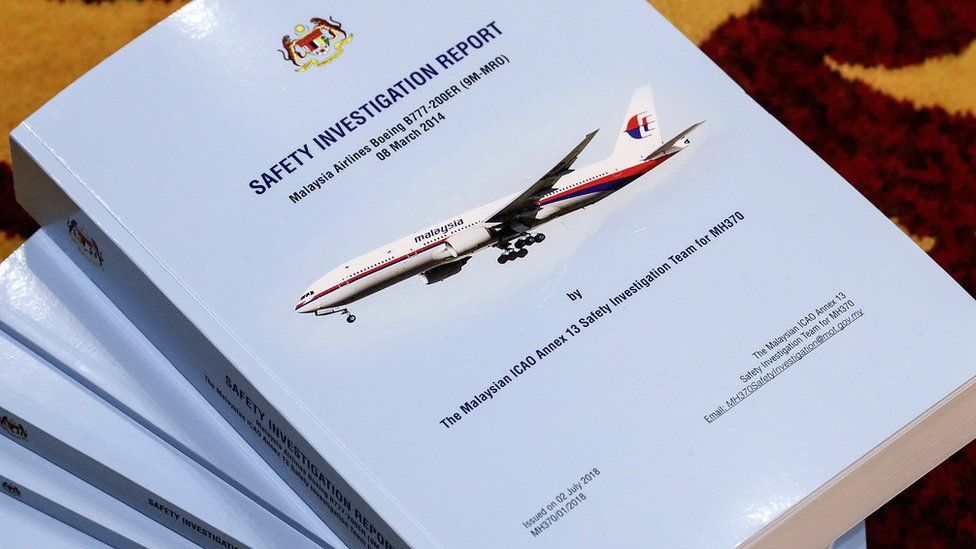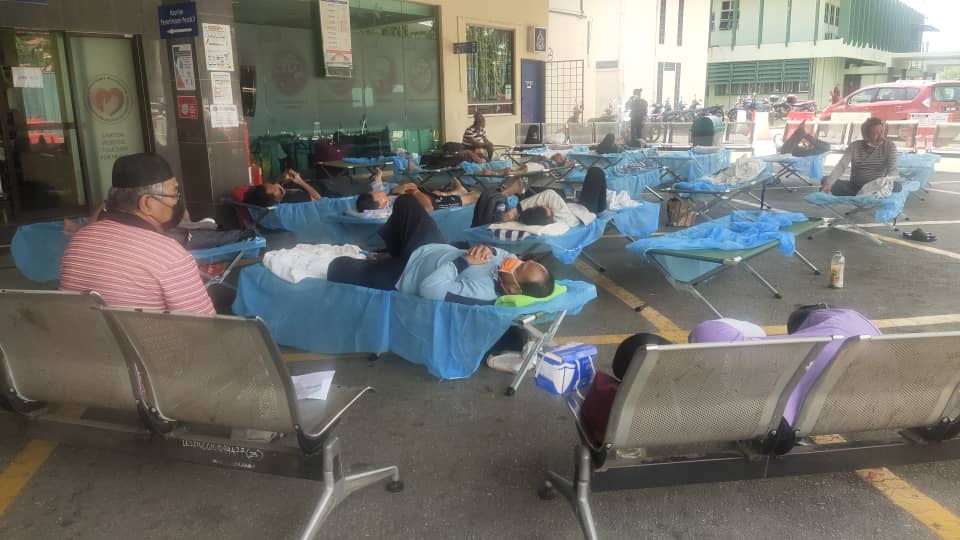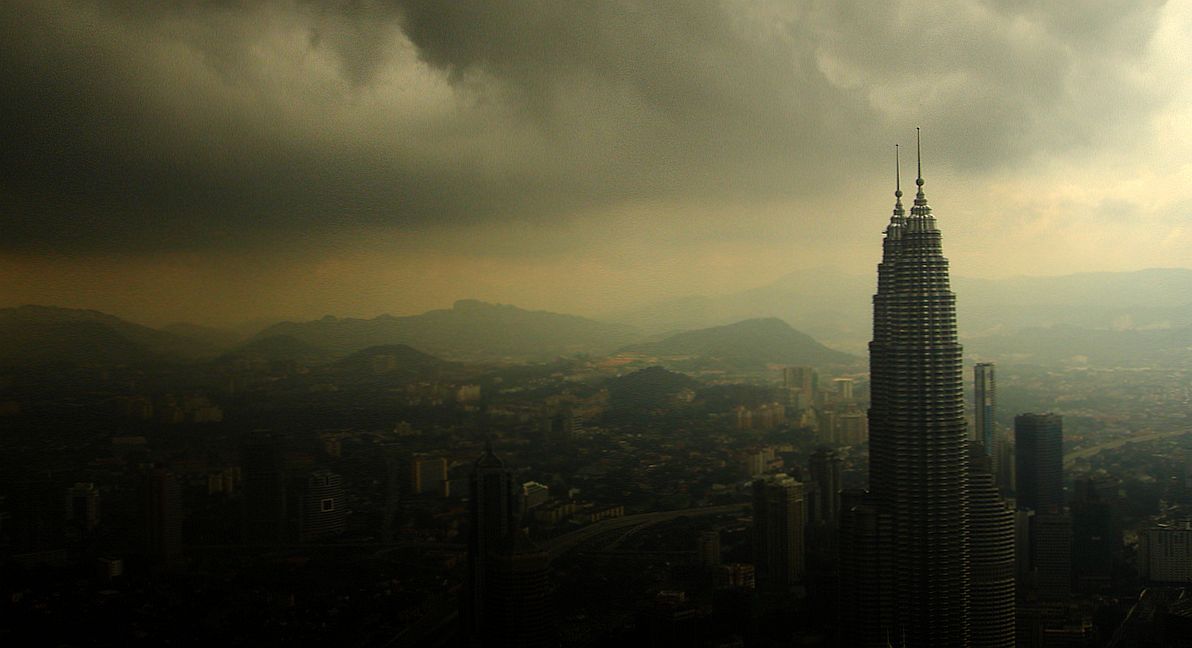A worsening pandemic, political upheaval, economic ruin, social despair, and a collapsing healthcare system means good news is hard to come by in Malaysia these days. How did we get here? And can it be turned around?
In my many years of living and working in Malaysia, this is genuinely as bad as I’ve seen it.
Malaysia wasn’t spared the devastation of the Asian Financial Crisis in 1997 and 1998, but due to some shrewd (and unorthodox) moves by then-PM Mahathir Mohamad, the country weathered the storm better than its regional peers, and became something of the poster child for can-do optimism in Southeast Asia. The soaring Petronas Twin Towers also opened around this time as the world’s tallest buildings, not only buoying a bruised country’s spirits, but becoming as much a national icon as anything before or since. By the closing days of the 1990s, Malaysia had come of age and arrived on the world stage.
The next decade – the dawn of the 21st century – saw growth and expansion in Malaysia, and, perhaps more importantly, a return to economic normalcy and stability. Investments flowed in, the impressive Economic and Government Transformation Programmes were launched, bold new projects were surging forward, and there was a sense of well-placed hope for the nation’s future.
But then, Malaysia lost an airliner.
A WATERSHED MOMENT
In 2014, which now seems a far distant memory, the standout crises of MH370 and MH17 cast Malaysia under a glaring international spotlight, a difficult test which the government of the day unquestionably failed, particularly on the former disaster. March 8, 2014 – the day MH370 disappeared – may well have been a turning point for the country.
In the wake of the tragedy, Malaysia’s nascent rise was swiftly derailed. As the days after MH370’s disappearance turned into months, with no answers and no aircraft, Malaysia somehow lost its swagger, lost its shine. And truth be told, it’s never quite recovered.

But for sheer ability to generate negative worldwide press about Malaysia, MH370 wouldn’t stand alone for long. The staggering vortex of corruption surrounding 1MDB in the following years added significantly to the country’s woes and threw the country into international headlines once more. It was naked corruption and embezzlement on a nearly unfathomable scale, and only the sheer volume of words that have been written about the 1MDB scandal exceed the scope of the crime itself.
It seemed that Malaysia just couldn’t catch a break, particularly in the way the country appeared to the rest of the world. Indeed, by 2017, for innumerable people outside of Asia who had been largely unfamiliar with Malaysia before, their entire perception of this small country in the tropics of Southeast Asia had now been distilled down to just five letters and four numbers: MH370 and 1MDB.
But those catastrophes may have just been the opening acts for what was to come in 2020 and 2021.
BUILDING AND TOPPLING
A swell of incandescent outrage and global shame over 1MDB proved far too much for Malaysians to bear, and in 2018, they descended on polling places en masse for the country’s 14th General Election, and in a truly historic moment, ousted PM Najib Razak and his entire government from office – the first time in Malaysia’s history that it would not be ruled by the UMNO-led Barisan Nasional coalition.
Perhaps as a coincidental throwback to Mahathir’s glory days, during which he oversaw the construction and unveiling of the iconic Petronas Twin Towers, Malaysia had once again embarked on a feverish skyscraper-building spree, with the two most notable towers rising into the sky the 1MDB-linked Exchange 106 and the breathtaking PNB Merdeka 118. For a brief time, Malaysia was energised and hopeful once again.

However, a resurgent Mahathir Mohamad – the very man who played a pivotal and crucial role in leading the Pakatan Harapan (PH) coalition to victory and subsequently assumed the premiership for the second time at the age of 93 – somehow could not let go of his old ways. Less than two years after his electrifying victory, Mahathir’s political machinations ended up backfiring on him. He was deftly outplayed at his own game, and his government was toppled as a result. Seemingly overnight, PH collapsed, Mahathir resigned, and the government was subsequently claimed by a new, unelected group called Perikatan Nasional (PN), with Tan Sri Muhyiddin Yassin installed as the new prime minister.
A month later, the coronavirus crisis exploded in Malaysia.
MARCH 18, 2020: IT BEGINS
The date is now etched into the memory of a coronavirus-fatigued rakyat. Last year, March 18 was the day we were introduced to a new phrase and a new acronym: Movement Control Order, or MCO. “Two weeks,” they said of the freshly announced lockdown at the time. And now, 16 very long months later, with nearly everything significantly worse than it was in March 2020, there is still no obvious end in sight.

Critics throughout Malaysia have rained scorn on Muhyiddin’s PN government in recent weeks, citing both its carousel of failures and the political brinksmanship being carried out amid the worst period yet of a devastating pandemic. Though some of the criticism is valid, it stands to reason that some may also be politically motivated. A pandemic won’t change that: Such is human nature, and such is political life in Malaysia.
However, Malaysia’s mounting woes have increasingly transcended the realm of domestic political squabbling and caught the attention of the outside world, and – as so often seems to be the case when Malaysia makes international news – it’s for all the wrong reasons.
A GROWING CHORUS OF CONCERN
CNBC, The Economist, Bloomberg, and Nikkei Asia have all run stories within the last two weeks regarding Malaysia and its handling of the pandemic, pointing to social and political issues, serious healthcare struggles, and, of course, mounting economic woes. Unanimously, the picture being painted is a grim one.
One Bloomberg story was related to its June Covid Resilience Ranking, published at the end of the month. Malaysia sunk dramatically from the previous month, landing at 50th place out of 53 countries. The ranking looks at a wide array of elements to derive a country’s ‘bounce-back’ status as it navigates the pandemic. Malaysia had the world’s lowest score when it came to ‘community mobility’ – no surprise to those of us living here and enduring an interminable procession of rolling lockdowns and domestic travel bans.
/cloudfront-us-east-2.images.arcpublishing.com/reuters/P33QMXPADZK7TBK5GLKUOXVTXI.jpg)
CNBC, meanwhile, noted that so far this year, Malaysia’s stock exchange was the worst performer in the entire Asia-Pacific region – and the fourth-worst worldwide – with the FTSE Bursa Malaysia KLCI Index declining 5.81% in the first half of 2021. (Also, it’s noteworthy that the World Bank has now revised its 2021 GDP forecast for Malaysia three times since late 2020, dropping the number every time.)
Want more? Sure, here’s The Economist fixing Malaysia in dead last place among the world’s 50 major economies for its Global Normalcy Index, another Covid-centred index.
Malaysia didn’t fare any better in the Nikkei Covid-19 Recovery Index, either, ranking a dismal 114th place out of 120 countries.
But the biggest bag of salt for Malaysia’s ever-increasing wound landed today, again courtesy of Bloomberg, which splashed across televisions and print and online media alike an op-ed saying that the “once-proud” Malaysia was now “staggering down the road to failed statehood.”
‘THE DREADED LABEL OF A FAILED STATE’
Okay, so that one really got my attention. Malaysia being lampooned as a ‘failed state’ is something I have seen and heard many, many times before, usually part of an angry screed on social media or in the comments section of a local news article, so initially I didn’t assign much gravity to the headline. But Bloomberg is a respected, global media powerhouse, so I felt compelled to read the article.
First, however, I looked up the term ‘failed state’ to get my bearings before diving in to the Bloomberg piece. It’s a real thing, of course, not just a colloquial political insult. Here is a sample of what I found as definitions:
- a state whose political or economic system has become so weak that the government is no longer in control
- a political body that has disintegrated to a point where the basic conditions and responsibilities of a sovereign government no longer function properly
- a nation in which the government has lost political authority and control and is unable to fulfil its basic responsibilities
Even a week or two ago, with the above definitions firmly in mind, I would have thought it irresponsible and inaccurate for any international media outlet to publish a story with “Malaysia” and “failed state” seriously noted in the same title.
But now? Now that we’re over five months into a so-called “state of emergency” which has left Malaysia with no functioning Parliament, and now that we’ve seen the latest lurid episodes of heavily criticised political manoeuvring and hasty job promotions for key allies, followed by UMNO dramatically revoking its support for PN and demanding the prime minister resign, all set against the backdrop of a rapidly deteriorating public health crisis and a lot of desperate Malaysians waving white flags (and plenty of angry ones waving black flags)… well, the whole ‘failed state’ moniker becomes a bit harder to casually dismiss, doesn’t it?

SHIFTING PERSPECTIVES
As a writer, it’s relatively easy to look at Malaysia (or any country) from the outside and pen a critical piece, especially if you’re not a citizen of that country. In such a situation, you are afforded the benefit of being a somewhat neutral, and hopefully objective, observer. And if I’m being frank, I don’t think there was much of anything in the Bloomberg article that was unfair, unreasonable, or untrue. It’s plain to see that Malaysia is in real trouble, and is quickly becoming embroiled in a dysfunctional mess from which – as the author very correctly notes – there is no easy way out.
But though I’m a foreigner, I’m actually here. I’m inside the country. And over my many years of living here, I’ve developed a deep affection for Malaysia and its people. I genuinely want this country to prosper and succeed. I want it to be a role model for the region. Unlike outside outsiders, I’m an inside outsider; I’m invested here. Malaysia is my adopted second home.
So while the Bloomberg article’s author can write dispassionately from a detached perspective while living in another land far away, when I write about Malaysia’s crushing woes, I do so from right here, with all the perspective of an affected and involved resident, and it actually hurts. I’m sure for Malaysians – people who love their country so much – it’s far worse.
Is Malaysia doomed? “It may only be a slight exaggeration to invoke the dreaded label of a failed state,” the Bloomberg op-ed says.
And my opinion? What I have learned is that failure is part of every person’s life at one point or another. And what is a country but a collection of people… flaws and all. But I have also learned that we need not be defined by our failures. We should instead grow, improve, find strength.

And what I have seen is the people of Malaysia – citizens, expats, refugees – stepping up and filling the gaps left untended by the country’s leaders. They’re caring for their neighbours. They’re checking on their friends. They’re delivering food baskets. They’re volunteering at vaccination centres and suicide prevention hotlines. They are, as contract doctors, working 100-hour weeks at significant personal risk. They are looking out for one another as part of a larger, shared community. This is what truly defines Malaysia.
So does Malaysia have failed leadership? Well, perhaps, but that’s not for me to say. Once again, I’m an outsider who just happens to be here on the inside. But is Malaysia a failed state? Not a chance. Not as long as the people living in it – all of us – still care enough today to forge a better tomorrow together.

Stay safe. Stay strong. Get vaccinated. Take care of each other.
"ExpatGo welcomes and encourages comments, input, and divergent opinions. However, we kindly request that you use suitable language in your comments, and refrain from any sort of personal attack, hate speech, or disparaging rhetoric. Comments not in line with this are subject to removal from the site. "























